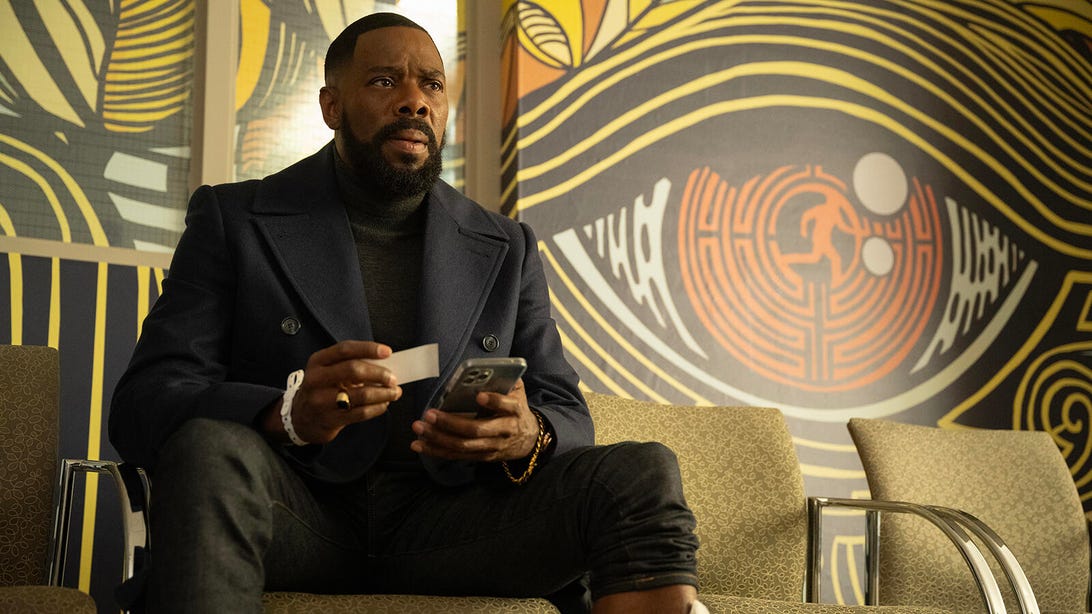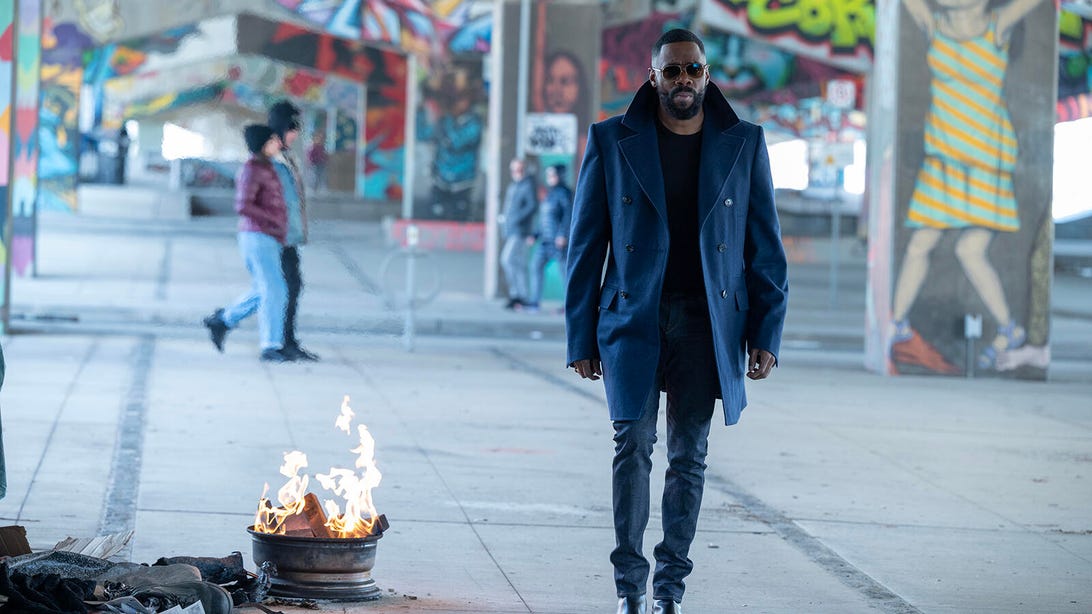Join or Sign In
Sign in to customize your TV listings
By joining TV Guide, you agree to our Terms of Use and acknowledge the data practices in our Privacy Policy.
How Netflix's The Madness Reinvents the Conspiracy Thriller
The series, starring Colman Domingo as a CNN pundit wrongly accused of murder, taps into the toxic power of fake news

Colman Domingo, The Madness
Amanda Matlovich/Netflix[Warning: The following contains spoilers for The Madness.]
A defining feature of the conspiracy thriller is their sense of precarity, starring characters who see their lives destroyed by unseen forces. In Hitchcock's North by Northwest, a case of mistaken identity drops a clueless ad executive (Cary Grant) into an elaborate tale of Cold War espionage. In The Fugitive, a wealthy doctor (Harrison Ford) faces an action-packed manhunt after being framed for his wife's murder. And between these two classics, the 1970s marked a wave of overtly political movies like The Parallax View and Three Days of the Condor, expressing a post-Watergate sense of distrust in government institutions.
Netflix's new limited series The Madness owes a lot to this lineage of thrillers. The series stars Colman Domingo as Muncie Daniels, a CNN pundit wrongly accused of murdering a white supremacist known as Brother 14. This puts Domingo, better known for weighty character roles, in full leading man mode, embodying the much-loved archetype of a desperate man on the run from the law.
As a Black TV journalist with a recognizable public profile but no real power, Muncie is the perfect fall guy, providing ample fodder for online conspiracy theorists and law enforcement alike. Realizing that the police have no interest in a serious investigation, Muncie must figure out how to clear his name while hiding from multiple enemies at once: law enforcement, far-right hate groups, Brother 14's billionaire benefactor (a characteristically smarmy Bradley Whitford), and of course whoever committed the actual murder.
By focusing on a Black hero pursued by the overlapping interests of U.S. law enforcement and white supremacism, The Madness revamps some familiar ideas from those classic 1970s thrillers — all of which starred white leads. Tapping into Trump-era disinformation and conspiracy culture, the danger of Muncie's situation feels all too real.
Early on, we learn that Muncie's late father was a high-profile activist who went to jail for killing a white landlord. This event inspired Muncie to shape his life in a different direction, avoiding radical politics and building a career within the establishment. Now a middle-aged public figure, he's comfortably wealthy and may soon get to host his own show on CNN. But once Brother 14's death makes the news, these privileges vanish overnight. Muncie loses his CNN gig and his reputation. Afraid of attracting controversy, his legal team abandons him. In fact, the only people he can trust are his family and their community in Pittsburgh.
As he's a fugitive, his daughter's neighbors shelter him with no questions asked, automatically sympathetic with his desire to dodge the police. His most useful ally turns out to be an old friend of his father's (Stephen McKinley Henderson), who leverages implicitly criminal connections to arrange a secret flight out of the country.

Colman Domingo, The Madness
Amanda Matlovich/NetflixAgain and again, The Madness hammers home the idea that America's ruling power structures are warped with rot. Corporate media outlets, the criminal justice system, big tech companies — none of them can be trusted. Muncie's only positive relationship with law enforcement is harshly transactional. FBI agent Franco Quinones (John Ortiz) promises to help him, but only if Muncie performs unpaid legwork on his own case, investigating Brother 14's connections in exchange for protection.
Of course, tonally speaking, The Madness isn't exactly a gritty realist drama. It's closer to the Fugitive end of the scale, unafraid to bulk out its supporting cast with a stock character or two. Muncie himself is a larger-than-life protagonist, benefiting from a narratively convenient backstory, and martial arts skills that come in handy during the occasional action scenes.
Episodic subplots take him to exciting locations like an anarchist gun compound, a swingers' club, and the backstage area of a Broadway theater. Meanwhile, his personal life is founded on familiar genre tropes, introducing Muncie as a distant father trying to reconnect with his estranged wife and kids. On the aesthetic side of things, Colman Domingo looks so good in a peacoat that he'd probably attract just as much attention from street style photographers as from surveillance operatives. Not exactly an unobtrusive fugitive. And that's without getting into the show's hilariously blatant Range Rover product placement.
But in a way, The Madness's cornier elements count in its favor. Fiction shouldn't have to be deadly serious to include meaningful themes, and this series strikes an accessible balance between thrills and political commentary. In doing so, it marks a change from risk-averse Hollywood trends, following a 20-year streak where studios tried to recreate The Bourne Identity's action while ignoring its cynically unpatriotic themes.
Rather than telling a story about generic double agents or corrupt cops, The Madness sets out a deceptively plausible kind of conspiracy. Online disinformation transforms random civilians into vitriolic harassers. Megalomaniac billionaires manipulate elections, and secretly fund the work of far-right extremists. Soon enough, Muncie begins to wonder if he himself is part of the problem, working in a news ecosystem that bolsters the status quo.
One of the most telling differences between The Madness and vintage thrillers is its lack of interest in journalism. Muncie Daniels is literally a CNN pundit, but aside from a brief interaction with an independent YouTube reporter, he never considers trying to solve his problems by going to the press. His nightmare unfolds in a post-truth world, where people would rather believe an entertaining story than a real one. By the end, he finds a way to get free and live life on his own terms, but the show doesn't pretend there's a simple solution to the broader problems at play, presenting 2020s America as a breeding ground for conspiratorial thinking.
The Madness is now streaming on Netflix.